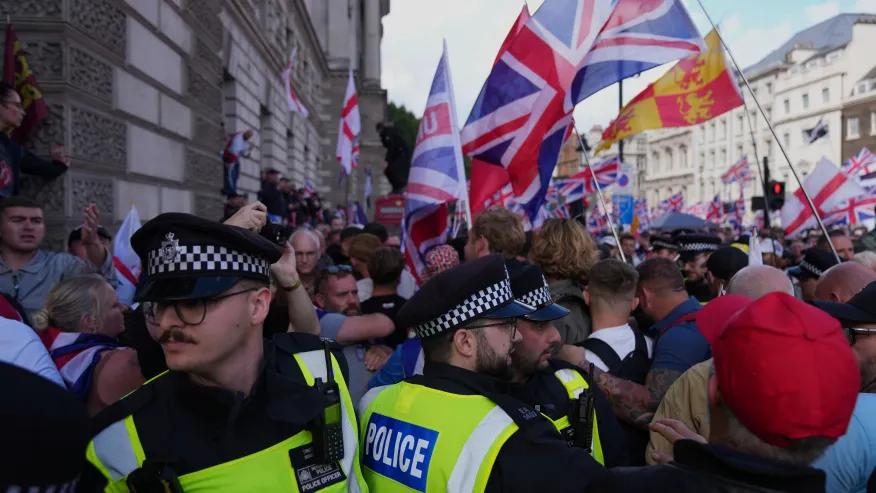British politicians have strongly condemned Elon Musk after he made inflammatory remarks during an anti-migrant rally in London. Musk, who owns X and Tesla, appeared by video link at the weekend’s “Unite the Kingdom” demonstration, where he warned that “violence is coming to Britain” and told protesters to “fight back or die.” His comments immediately sparked anger among political leaders who described the remarks as dangerous and irresponsible.
Prime Minister Keir Starmer said that Musk’s language posed a threat to peace and safety in the country. He stressed that Britain is a fair and tolerant nation, and the public would not accept words that encourage violence or intimidation. Starmer also condemned violent incidents that occurred on the fringes of the protest, where some demonstrators clashed with police. Officers reported 26 injuries, including four serious cases, and 25 arrests were made. Authorities have said more arrests are likely.
The rally was organized by far-right activist Tommy Robinson and drew more than 100,000 people. While it was promoted as a march in defense of free speech, many of the speeches were focused on immigration and the supposed dangers of migration. Protesters waved Union Jacks and St. George flags, symbols that in recent years have been used both as patriotic emblems and as markers for anti-immigration movements.
Opposition figures joined in criticizing Musk. Liberal Democrat leader Ed Davey accused him of trying to sow division and called for him to be blocked from receiving UK government contracts. He urged leaders of all major parties, including Conservative leader Kemi Badenoch and Reform UK’s Nigel Farage, to unite in condemning Musk’s interference in British democracy. Despite this, the government said it does not plan to sanction Musk.
The demonstration also reflected rising political tensions over migration. More than 30,000 people have already crossed the English Channel this year, the highest number at this point in the year since records began in 2018. The use of hotels to house asylum seekers has fueled local anger, leading to small but sometimes violent protests in towns across Britain. Immigration has become one of the most pressing issues for voters, rivaling concerns that dominated the Brexit years.
Experts say the growing use of flags at protests is significant. Sunder Katwala of the think tank British Future noted that flags can unite people or divide them depending on the motives behind their use. James Freeman, a political historian at the University of Bristol, explained that using flags to mark areas as off-limits or to intimidate communities is not new in history, though linking the St. George flag with the far right is a relatively recent development.
Starmer, while defending the importance of national symbols, said Britain must not allow extremists to claim them as tools of division. He emphasized that the Union Jack and the St. George flag represent a diverse and tolerant nation. Writing on X, he declared that Britain is built on values of respect and inclusion and that the country will not surrender its symbols to those who want to spread fear and hatred.
This latest clash between political leaders and Musk highlights the wider debate over immigration, national identity, and freedom of expression in Britain. While some view protests as a defense of free speech, others see them as a dangerous platform for extremism. The government continues to face pressure to balance free expression with the need to protect communities from intimidation and violence linked to migration debates.

